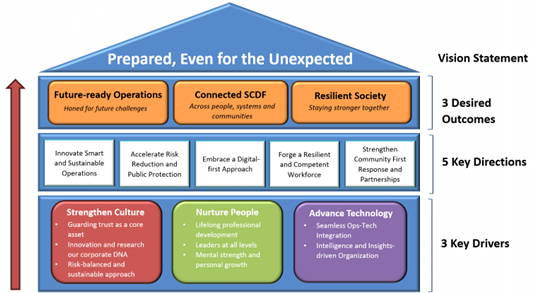The new transformation framework for 2030 is designed to build upon and advance the existing plans, aligning with the Ministry of Home Affairs' strategic priorities and the Home Team Transformation 2030 plan. The framework focuses on three key drivers, five key directions, and three desired outcomes, as depicted in Figure 1.

Figure 1. Transformation 2030 Framework
The key drivers are the cross-cutting factors that fuel the key directions and support the attainment of the desired outcomes. They are:
- Strengthen culture. SCDF will continue to build a robust culture and identity anchored in its core mission of saving lives and property, while also building strong public trust and generating operational impact. SCDF will also foster a culture of risk-balancing, innovation, and research to enhance its capabilities and safety.
- Nurture people. SCDF will nurture our people as our most valuable asset, providing lifelong opportunities for professional development, equipping them with relevant competencies, and valuing their diverse strengths and perspectives. SCDF will also prioritise the holistic wellbeing of its people, encompassing physical, mental, emotional, and social aspects.
- Advance technology. SCDF will embrace its technology as a fundamental enabler of efficiency and agility, becoming an intelligence- and insights-driven organisation that harnesses data and leverages advanced analytics for organisational decisions and operational outcomes. SCDF will also connect people, systems, and communities through technology to enhance collaboration and resilience.
The key directions are the strategic thrusts that guide the development of actionable initiatives and are anchored by one or more major flagship projects. They are:
- Innovate smart and sustainable operations. SCDF will innovate and enhance its operational capabilities to meet the dynamic and diverse needs of the community, optimising resources, and responding faster and smarter. SCDF will also adopt and drive sustainability efforts in the domain of emergency response, such as the electrification of emergency vehicles. more efficient use of firefighting media, and reduction of the environmental consequences of incidents.
- Accelerate risk reduction and public protection. SCDF will leverage smart fire safety systems and smart building management systems to enhance its early warning and response capabilities, as well as reduce fire safety non-compliances. SCDF will also leverage the Fire Research Centre to develop cutting edge fire science knowledge and drive innovative fire safety solutions to better protect the population from new and emerging risks.
- Embrace a digital-first approach. SCDF will adopt a digital-first mindset and approach, transforming its processes, systems, and platforms to harness data and technology for better outcomes. SCDF will also uplift its technology literacy and develop a core of highly competent ops-tech officers to drive the operations-technology nexus.
- Forge a resilient and competent workforce. SCDF will equip its workforce with the most up-to-date and relevant skills and competencies to succeed professionally and develop individually. SCDF will also nurture leaders at all levels and foster a supportive and inclusive work environment that promotes mental strength and personal growth.
- Strengthen community first response and partnerships. SCDF will strengthen its role as a community advocate and partner, creating an inclusive whole-of-society ecosystem that enhances community connectivity and resilience. SCDF will also deepen its engagement with existing networks of Community First Responders (CFRs), the private sector, and global partners, expanding the roles that everyone can play and making safety everyone's responsibility.
The desired outcomes are the three core areas that represent SCDF's envisioned future state in 2030. They are:
- Future-ready operations. SCDF will move from a reactive response-centric approach to a proactive risk detection and monitoring approach, reducing the occurrence and extent of incidents. SCDF will also respond swiftly and effectively to incidents, supported by data analytics, smart systems, and purpose-built robots. SCDF will also prioritise high-acuity cases and enhance patient outcomes through guidelines-based care.
- Connected SCDF. SCDF will be intrinsically connected across people, systems, and communities, enhancing collaboration and coordination. SCDF will leverage a central data analytics engine, SCDF's Intelligent Core (iCore), to aggregate and harness data for anticipatory operations, fire safety management, and community building. SCDF will also network its responders, machines, appliances, systems, and infrastructure to optimise sensemaking, command, and control.
- Resilient society. SCDF will foster the growth of a resilient society fortified by cutting-edge emergency response capabilities and community-driven preparedness. SCDF will also place proactive emphasis on public education and emergency readiness skills, using technology and innovation to create realistic and engaging scenarios. SCDF will also support and empower CFRs and partners to drive ground-up initiatives and expand their roles beyond firefighting and medical emergencies.
